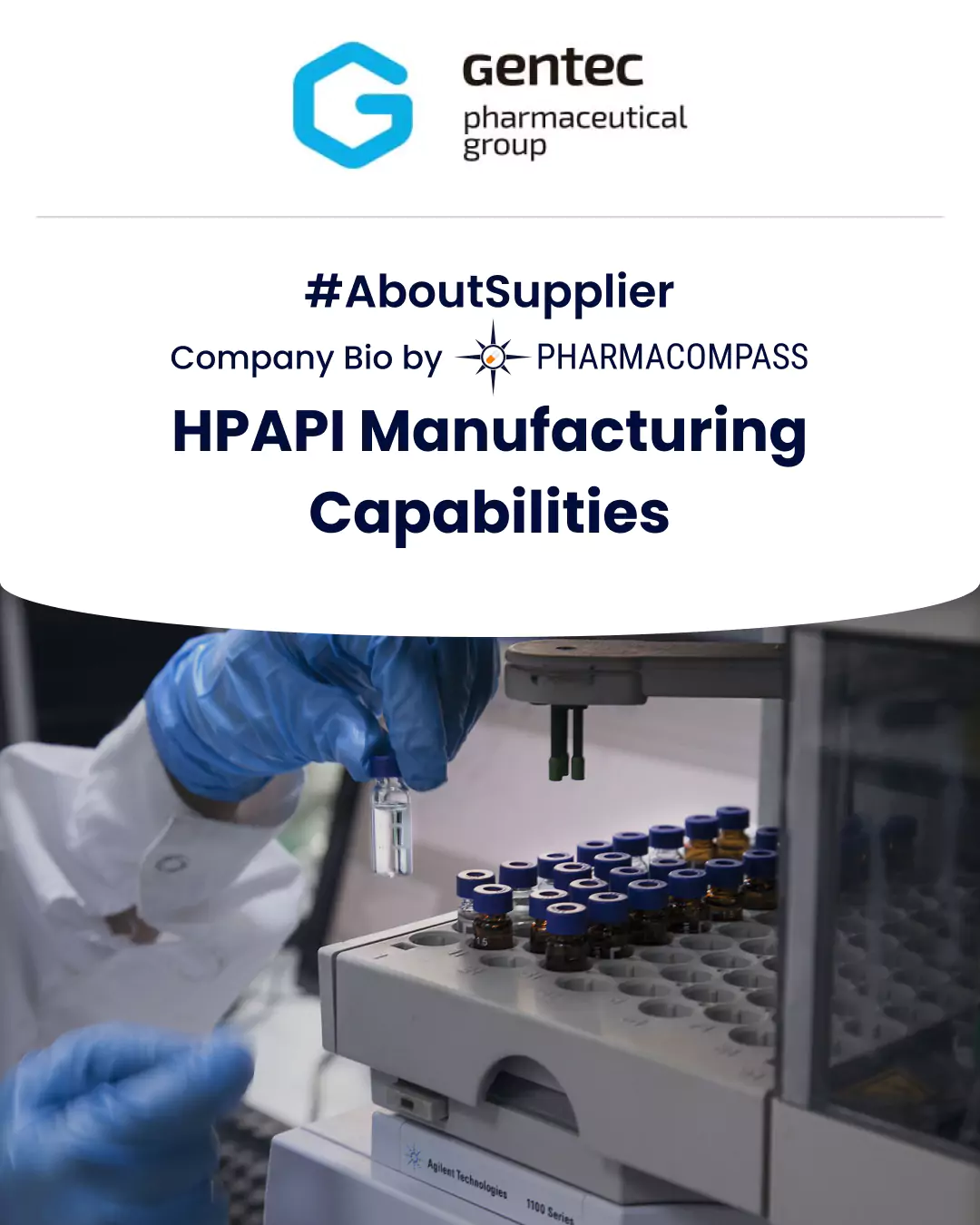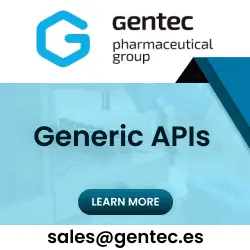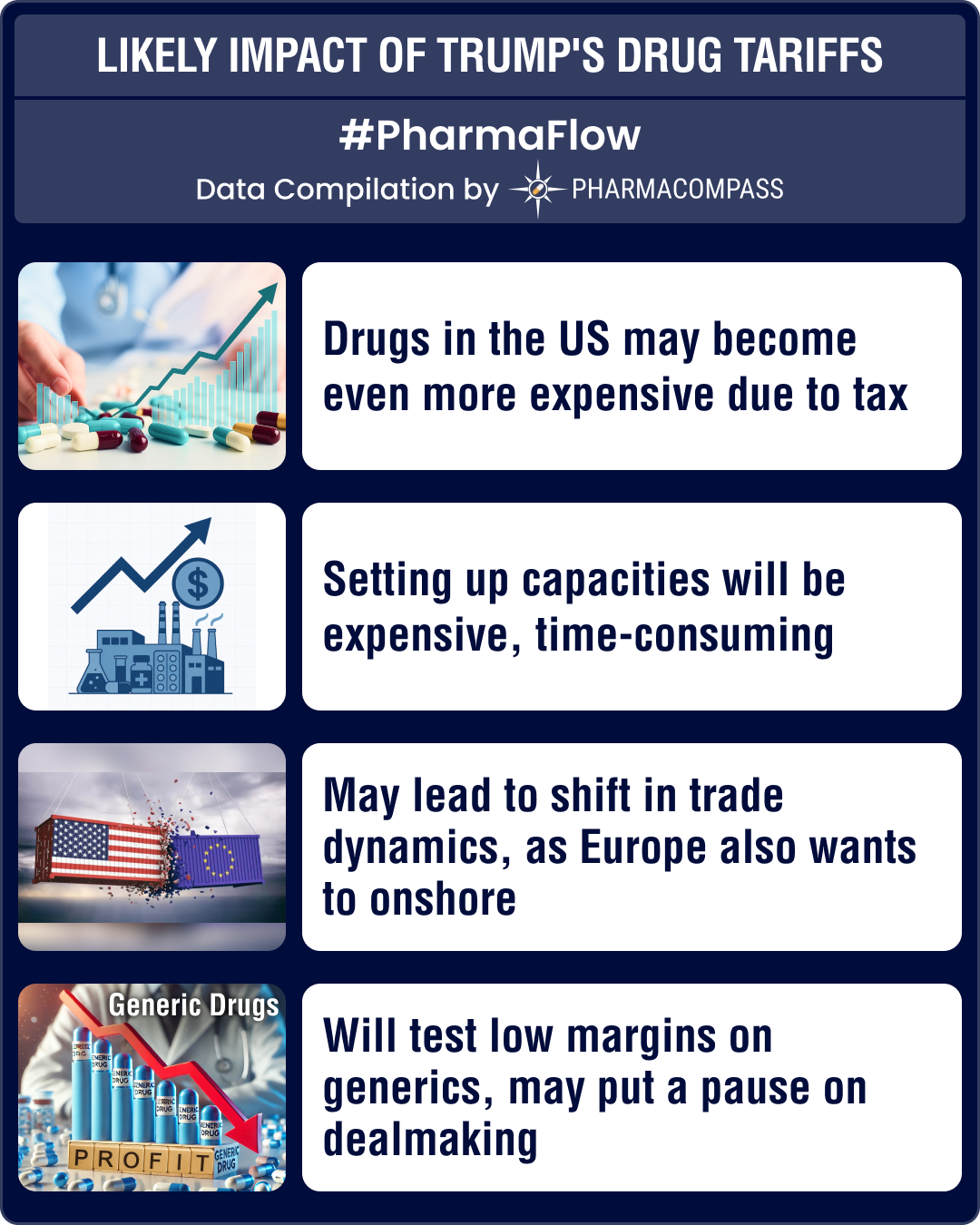
By PharmaCompass
2022-04-12
Impressions: 1287
Overview of highly potent or high potency API (HPAPI) & more on Gentec's contract manufacturing services for high potency drugs on PharmaCompass.
Q1. What is a highly potent API (HPAPI)?
A highly potent API (HPAPI) is defined as an active pharmaceutical ingredient (API) with biological activity at approximately 150 µg/kg of body weight or below in humans (therapeutic daily dose at or below 10 mg). High potent active pharmaceutical ingredients (HPAPI) are effective at much smaller dosage levels when compared to traditional APIs. These high potency drugs usually have the ability to bind selectively at low doses to specific receptors or inhibit specific enzymes as part of oncology or hormonal therapies.
Highly potent APIs or high-potency APIs (HPAPIs) are synthesized through multiple process steps that require advanced technologies like peptide coupling, mPEG/PEGylation, chiral resolution, biocatalysis, continuous processing and cryogenic reactions.
Because a growing number of pharmaceutical products contain highly potent active pharmaceutical ingredients (HPAPI), demand for the production of HPAPIs has increased. Driven by oncology research and more targeted therapies, highly potent APIs are being increasingly used in the drug development pipeline. The high potency drugs mark a significant change in the way innovators are using small molecules to deliver new patient therapies.
Driven by its use in oncology, the global market for highly potent active pharmaceutical ingredients (HPAPI) is registering a high growth. An increase in the clinical pipeline of highly potent API (HPAPI), ADCs and biologics, have changed the demands of contract manufacturing service providers such as CMOs or CDMOs for the production & development services for HPAPIs (highly potent APIs).
High-potency active pharmaceutical ingredients (HPAPIs) are a niche but fast growing area for pharmaceutical manufacturers like contract development and manufacturing organizations (CDMOs) and contract manufacturing organizations (CMOs). These highly potent APIs, also known as high-potency APIs (HPAPIs), require multi-step processes or semi-synthesis, necessitating specialized considerations in facility design, equipment, operation and process safety to achieve the requisite level of containment for the high potency APIs (HPAPIs).
Only a few CMOs have the HPAPI capabilities to offer both production & development services for HPAPIs (highly potent APIs) and to scale-up small-scale development lab quantities to large-scale commercial volumes. The main advantage of outsourcing HPAPI contract manufacturing services or contract manufacturing of highly potent compounds is that it eliminates the need to invest in costly containment infrastructure that can also be difficult to engineer, install and maintain.
Q2. What are some different containment challenges associated with high-potency APIs (HPAPIs)? How are these challenges addressed?
Production & development services for HPAPIs (highly potent APIs) present a new set of challenges in terms of safe handling and containment during process development, clinical and large-scale production of highly potent API.
The containment challenges associated with high-potency APIs are noted below:
- The cytotoxic nature of highly potent APIs presents significant handling challenges, and thus requires heavy investments for the implementation of specialized containment facilities.
- Employee exposure to highly potent APIs is typically the primary area of concern for manufacturers of HPAPI.
- The early HPAPI (highly potent API) development phase sometimes creates a challenge for categorization. At times, sufficient information is not available to allow for a clear assessment of risks.
- Additionally, the manufacturing of high-potency active pharmaceutical ingredients (HPAPIs) requires an isolated environment that is usually equipped with isolators and cleanrooms.
- It is a challenge to protect the API from contamination or cross-contamination from other HPAPIs made in the facility or the site. This risk can come from both previous and concurrent operations.
- Working with highly potent active pharmaceutical ingredients (HPAPIs), which are highly potent and cytotoxic, entails a slew of regulations and requirements. It also poses challenges for pharmaceutical companies (eg. CDMO, CMO) in terms of handling, containment and cost for HPAPI contract manufacturing services.
Working with an experienced pharmaceutical outsourcing organization such as a CMO or CDMO for contract manufacturing of highly potent compounds, can help eliminate challenges like investing in expensive infrastructure and the cost of training staff for the production of an highly potent API and offering HPAPI contract manufacturing services.
Containment challenges can be handled through the following ways:
Large-scale production of highly potent API necessitates specialized approaches in facility design, equipment selection and manufacturing processes to overcome high potency API (HPAPI) containment challenges, to minimize exposure of operators and to ensure the protection and safety of the workers. For successful HPAPI (highly potent API) development, extensive knowledge and experienced staff are required.
- Highly potent active pharmaceutical ingredients (HPAPIs) have a specific occupational exposure limit (OEL) that must be kept in mind to ensure safe handling, as there is a selective process in choosing the most appropriate containment strategy.
- To avoid contaminating surfaces and to establish a safe working environment for employees, it is essential to put a thorough cleaning program in place.
- The entire isolator should be cleanable in a reproducible and quantifiable manner to avoid any chance of cross-contamination. During qualification, swab tests and tracer substances should be used.
- It is necessary to carry out a careful assessment of the hazards posed by each and every product, reagent and intermediate involved in the synthesis before manufacturing highly potent API (HPAPI).
- Sophisticated facility design elements that are used to address containment challenges for a highly potent active pharmaceutical ingredient (HPAPI) include several tools to ensure safe handling of HPAPIs. In addition, well-designed protection methods include nuanced and detailed processes regarding how workers should use and clean HPAPI manufacturing Aassets.
- A manufacturer of HPAPI should consider several areas in order to safely manage highly potent active pharmaceutical ingredients (HPAPIs) processes. For example, proper training should be provided to offer staff a comprehensive High Potency API (HPAPI) handling programme.
- Following standard risk management and industrial hygiene methodology, it is critical to first recognize, analyze and control the handling of high potency drugs and then to revisit this process on a regular basis, capturing any changes in the available product data, manufacturing processes, etc.
Q3. What are the recent trends in the manufacturing of highly potent drugs?
An increasing focus on highly potent active pharmaceutical ingredients (HPAPI) in the pharmaceutical development pipeline has resulted in a growing demand for HPAPI capabilities to safely handle and contain such hazardous ingredients. A high potency API (HPAPI) has the potential to achieve similar efficacy at a lower dose than conventional APIs, which is appealing to drug developers because it reduces patient exposure to medication.
High-potency APIs (HPAPIs) are becoming increasingly popular. Around a third of all drugs in the pharmaceutical pipeline are categorized as high potency active pharmaceutical ingredients (HPAPIs). With the market size for High Potency API (HPAPI) expected to grow at a CAGR of 8-10% through 2025, this percentage is likely to increase further.
With this changing landscape and the focus being on high-potency APIs (HPAPIs), the challenges in HPAPI and cytotoxic drugs manufacturing have also increased, along with investments, in terms of specialized containment areas and procedures to prevent personnel and environmental exposure. A pharmaceutical CMO or CDMO has the capability to offer HPAPI Contract Manufacturing Services.
Isolator design, laboratory design and containment practices are critical for safe HPAPI and cytotoxic drugs manufacturing. The advancement of technology and knowledge has greatly improved worker safety, but this has led to a corresponding increase in the cost of facility design, construction and operation.
While a key focus in HPAPI and cytotoxic drugs manufacturing is the adaptation of traditional processing techniques to maximize containment, new technologies such as continuous flow manufacturing (CFM) are particularly promising, where closed systems can be utilized to improve upon traditional containment practices.
The shift towards highly potent API (HPAPIs) has led to more effective medicines, with potentially lower dose requirements and fewer side effects. HPAPI manufacturing also presents major handling challenges for innovators and their developers as well as manufacturers of HPAPI.
Companies are now looking for flexible containment solutions to help address their needs. This trend is expected to continue to grow in the coming years. However, if the current development focus on highly potent API (HPAPIs) continues to show more efficacy and fewer side effects than currently marketed products, highly Potent drugs are likely to become one of the most dominant areas in the industry.
Continuous flow manufacturing (CFM) is highly attractive for large-scale production of highly potent API. It holds a lot of promise for experienced chemical process development and engineering groups to design safer and more efficient processes in the future.
Q4. What pharmaceutical HPAPI manufacturing services does Gentec offer?
Gentec is a contract manufacturing organization (CMO) which manufactures APIs (active pharmaceutical ingredients), HPAPIs (high-potency active pharmaceutical ingredients), advanced intermediates and fine chemicals for the pharmaceutical industry. It also provides raw materials to the food industry.
Gentec, at its Duke Chem and Pharmanoid facilities, offers the development and manufacture of APIs, intermediates and contract manufacturing of highly potent compounds. Its multipurpose and multi-product facilities are cGMP compliant. A team of over 60 employees, including specialized professionals with extensive experience in the chemical and pharmaceutical sector, make up the workforce.
Gentec's Pharmanoid plant develops and manufactures high-potency active pharmaceutical ingredients (HPAPIs), including several prostaglandins for ophthalmic use. The facility is cGMP certified, allowing it to handle high-potency active pharmaceutical ingredients (HPAPIs) while providing a safe environment for the people.
Gentec's multifunctional plants have HPAPI capabilities and can carry out complex multi-step industrial processes. Gentec not only offers HPAPI contract manufacturing services, but is also involved in the distribution of APIs.
The PharmaCompass Newsletter – Sign Up, Stay Ahead
Feedback, help us to improve. Click here
Image Credit : Biosynthesis, tech advancements by PharmaCompass is licensed under CC BY 2.0
“ The article is based on the information available in public and which the author believes to be true. The author is not disseminating any information, which the author believes or knows, is confidential or in conflict with the privacy of any person. The views expressed or information supplied through this article is mere opinion and observation of the author. The author does not intend to defame, insult or, cause loss or damage to anyone, in any manner, through this article.”







